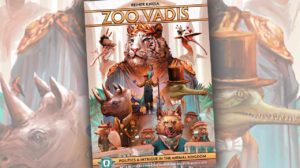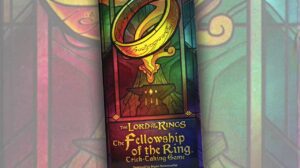Barrakuda – Andrew Lynch
In Barrakuda, players compete as divers, racing between six different locations while trying to be the first to vault seven gold. Each player has a hand of cards, numbered from 1-6, corresponding to six of the seven locations on the table. Meanwhile, a nasty barracuda is swimming around, causing divers to drop what money they’re managed to snag so far. Players simultaneously reveal their cards, moving to those locations. Things I like about it: the play area setup is variable (though it’s less impactful than I’d like), and the movement selection system gives things a little bit of an Istanbul-y feel that I can’t fully explain yet because I just started thinking about it.
Ease of Entry?
★★★☆☆ – There were a few questions
Would I play it again?:
★★☆☆☆ – Would play again but would rather play something else
Read more articles from Andrew Lynch.
Tucano – Andy Matthews
Swiss game maker Helvetiq publishes delightful little games; portable, bite-sized morsels, perfect for filling in the corners of any game night. One of their newer titles, Tucano, recently graced my table and I’m pleased to say that it maintains their streak of games I enjoy. In Tucano almost everything you need to know about the game is printed right on the skinny deck of cards. On your turn take one of 3 stacks of fruit cards on the table, then refill every stack with one card each. The trick is that there are over a dozen fruit cards, each with distinct scoring conditions. So while you might want that single coconut worth 8 points, you’d also be forced to take a pomegranate which is negative 1 point (unless you have the most pomegranates). Tucano is filled with lots of low level decisions that all add up to a delightful experience.
Ease of entry?:
★★★★★ – No sweat
Would I play it again?:
★★★★★ – Will definitely play it again
Read more articles from Andy Matthews.
Speakeasy Blues – Bob Pazehoski, Jr.
Straight out of the Prohibition era, Speakeasy Blues wraps a solid central mechanic in a minimalistic Art Deco style. This one revolves around ten dice—five colored pairs bearing game-specific icons. At the outset of a turn, six dice are already on the board in some of the seven available locations (fourteen total spaces), while four are in the off-board pool. Players remove one colored pair from the board, freeing up spaces, and roll them into the pool. They then choose one colored pair from the pool and place them on the board according to their icons, carrying out the matching actions. It’s a multi-layered decision with a lovely give and take.
The rest of the game is about set collection and gaining majorities. Society figures, Gangsters, and Cultural icons come to rest in the various Speakeasies, affecting Reputation and bringing Favors. And let’s not forget the amazing little bottles of hooch—a singular highlight from the components. The scoring is a little counterintuitive in ways, but the game is cleanly laid out and the iconography (of which there is plenty) is easy enough to read. We found it hard to lay out a strategy in the first few rounds, but by the halfway mark, we already had ideas to try in the next play. The style is right up my alley, and there are definitely multiple plays in the box.
Ease of entry?:
★★★☆☆ – There were a few questions
Would I play it again?:
★★★★★ – Will definitely play it again
Read more articles from Bob Pazehoski, Jr.
Planet Unknown – Justin Bell
Two friends of mine had shipments of Planet Unknown arrive this week, so there was lots of excitement as we pushed to get this one to the table immediately.
Planet Unknown is a polyomino tile-laying game with a sci-fi theme, double-sided neoprene mats, a “lazy Susan” spinner which doubles as the central component holding tiles, rovers, meteorites, and tracks. Lots of tracks.
As a production, it’s fantastic, although the $150 price tag for the deluxe version of this game felt a tad high. As a game, I’m not sure where I land; one player’s score was 50% higher than everyone else’s, and I can’t tell how he broke so far away from everyone else. Planet Unknown is really simple to teach and does not overstay its welcome, to the point where you could run two games back-to-back in an hour with a group of 3-4 players, easy. I’m just not sure I want to play it again.
Ease of entry?:
★★★★☆ – The odd bump or two
Would I play it again?:
★★☆☆☆ – Would play again but would rather play something else
Read more articles from Justin Bell.
1001 Islands – David McMillan
1001 Islands is a tile-drafting, tableau builder which takes place in the world of 1001 Arabian Nights. There are four stacks of face down tiles. Three of these feature images of things such as palm trees, bandits, gems, and various animals. The other is a stack of scoring tiles. On a player’s turn, they will select a stack to draw tiles from, draw a number face up equal to the number of players, and then choose one to keep. Then they dictate who takes the next tile. That person dictates who takes the next, etc. The last person to take a tile becomes the first person to select a stack to draw from during the next round.
At the end of the game players earn points for their scoring tiles, points for palm trees and roc/egg pairs (two of the images featured on some of the tiles), and lose points if they have the most bandits. The player with the highest total wins.
I’m a big fan of these two designers and I’m a big fan of games that feature the mechanics present in this game. So it should come as no surprise that I enjoyed this experience immensely. I played it at a three player count and this created a unique situation in which the first person to choose a tile was given the power of determining the turn order for everyone else. What they couldn’t determine, though, was who would take which of the remaining tiles. There was at least one occasion toward the end of the game where each of us spite-drafted a scoring tile in order to deny it to one of the other players even though it scored zero points for ourselves. That was a very tough decision to make, but it didn’t matter in the long run. The person that actually won did so by a very large margin. At the most, the other players’ spite-drafting efforts just meant that the winner won by a few points less than they would have otherwise.
I look forward to getting this one to the table again at higher player counts. I’m curious to see how that would change things.
Watch out for my upcoming review.
Ease of entry?:
★★★★★ – No sweat
Would I play it again?:
★★★★★ – Will definitely play it again
Read more articles from David McMillan.















Add Comment